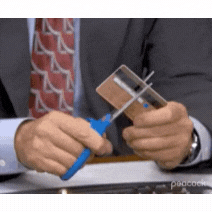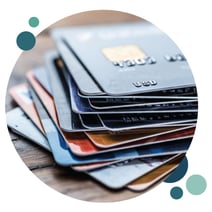How Many Credit Cards is Too Many?
.jpg)
Ok, let's just rip the band-aid off and get straight to it - How many credit cards is too many? There's no exact number of credit cards to have, and it varies for every credit cardholder. It’s certainly good to have one, but it wouldn’t be bad if you had two (or six!) credit cards sitting in your wallet today. What really matters is how you use it.
It's a frustrating answer, right? But don’t worry – I can explain….
The cool thing about credit cards is the benefits, and there are so many to choose from! There are store credit cards, cards specifically for air travel, and more credit cards offering cool rewards and perks like cash back or discounted rates at your favorite restaurant. Having options of which credit card to use before making a purchase can feel like you’re 100% covered where you have the flexibility you need for the unexpected. Especially if you're not carrying large amounts of cash.
"But how many credit cards is too many?!"
As an undergrad, this was my question when I received multiple credit card offers in the mail. It was sooo tempting to apply because the offer meant more credit power at my disposal if approved. But I also had other questions that came with that:
- What would multiple credit cards mean for my credit score?
- Would it hurt or help my score and history?
- Is there a penalty for having too many credit cards?
- Could I wind up incurring more debt?
- What should I do with my current credit cards?
These are all excellent questions to ask when you’re thinking about applying for another credit card and if you already have two or more. Understand there is a risk of having multiple credit cards and there are benefits but it depends on a few factors.
 how many credit cards is too many to have?
how many credit cards is too many to have?
As I mentioned in the beginning, the ideal number of credit cards to have is not the same for everyone. It truly depends on how responsible you are with your cards and your credit history. Plus, if you're thinking about applying for an additional credit card, the lender may have their own criteria since each lender has its own level of risk, credit scoring system, and formulas when reviewing credit card applications.
The attractive part about having more than one credit card is when managed right, it looks good on your credit report. When lenders report your credit card or loan activity to the credit bureaus, they like to see that mix of credit on your report. The types or mix of credit you have factors in 10% of your credit score.
QUICK TIP: Just don't start applying and opening numerous credit cards and other lines of credit in a short time frame. It could heavily knock your credit score down. A good rule of thumb is to look into no more than 2 accounts per year. |
 what are the benefits and risks of having more than one credit card?
what are the benefits and risks of having more than one credit card?
Having more than one credit card is great when you know what you're doing, but it can hurt you if you misuse the card and become an irresponsible cardholder. Here's a closer look at what I mean:
Benefits of having more than one credit card
- Improve your credit score: More than one credit card could help with your credit score if you keep your balance on the card low. This helps with your credit utilization ratio (which is the amount of credit you're spending in comparison to the amount of credit you have available). Psst… that utilization ratio helps make up 30% of your credit score.
- Enjoy more rewards and perks: Depending on the type of credit card you have, the card could have some cool rewards and other perks. Many lenders offer rewards based on the type of purchase you make or the number of purchases you made which accumulates into points. Depending on the rewards you could get cashback, discounts at a restaurant, or travel deals on your next trip. If you have more than one credit card offering these types of rewards and perks the benefits would be twice as good.
- Credit card use for different expenses: Some cardholders use multiple checking accounts to manage their expenses, others use credit cards since it looks good on your credit report. You could use one credit card to pay bills, another card for groceries and dining, and another credit card specifically for traveling and just pay it off each month. Make sure you have a budgeting plan in place if you use different cards to manage your expenses. Things could add up and costs could be unmanageable. Here are some budgeting tips to use to build and keep your expenses in shape.
Risks of having more than one credit card
- Could hurt your credit score: Earlier I shared a quick tip about applying for multiple credit cards in a short time frame can hurt your credit score. A good rule of thumb is to look into no more than 2 accounts per year.
- Too much debt to handle: Having more than one credit card can be great but if you start missing payments past the grace period that'll look bad on your credit report which will knock your credit score down. Another risk with more than one card is the amount of debt you could incur. Managing more than one credit card could be a lot to handle which could turn into late fees, interest fees, and more depending on the lender. Make sure you know what you're getting yourself into when having more than one credit card.
QUICK TIP: If you are struggling to manage multiple credit cards or feel like you're paying too much interest, consider doing a balance transfer where you consolidate your debt onto a credit card! Here's a closer look at when to consider doing a balance transfer. |
Risk of fraud: Credit cardholders experience identity theft, too. When you have multiple credit cards and can't keep track of them all, it's possible to lose one. If you experience identity theft, contact your lender right away. To avoid this from happening, start tracking your credit card expenses. We’ve outlined some tips to help you track here.
 what'll happen if I close a credit card?
what'll happen if I close a credit card?
You may want to close a credit card because the fees may be too much to handle on top of that, it could be one less payment due date you have to worry about. Proceed with caution if you choose to close a credit card account because it can lower your credit score. Especially if it's an account that’s in good standing and has been open for several years.
Closing a credit card account can affect you in a few ways:
- Less Spending power: This is an obvious “duh” but the amount of credit you have on a card truly gives you spending power to cover unexpected emergencies. You’ll lose that once the account closes.
- Closing could increase your credit utilization ratio: Since your credit utilization ratio is the amount of credit you're spending in comparison to the amount of credit you have available if you close the credit card account, you’re reducing the amount of available credit, which could cause your credit utilization to go up and your credit score to go down. In other words, closing a card account means you’ll lose the credit limit available which increases the credit percentage that you’re using. A good rule of thumb is to keep the utilization ratio at 30%. Closing it bumps that percentage up which lowers your credit score.
- Reduce the average age or length of credit on your credit report: Your age or credit length affects your credit score and closing the account reduces your score.
The good part about closing a credit card is you’re eliminating debt and you can focus on managing your other credit cards.
how can I maintain my credit score without the card?
If you don’t want to reduce your average age or length of credit on your report, first pay off the debt on your credit card and limit the number of times you use it or don’t use the credit card at all. You can also freeze your card so you won’t be able to use the card on the fly but will have access to it if you ever need the extra cash flow and want to maintain the credit line.
Depending on the lender, your credit card account could be closed due to inactivity. If you limit the number of times you use the credit card and keep the balance low, this can work in your favor. You can buy one small thing like a pack of M&M’s or a pack of toilet tissue once a month and pay off the balance.
If inactivity is not a requirement for the lender and you're looking to reduce the temptation of spending, keep the credit card at home or grab some scissors and cut it up. Just don't forget your account information in case you need to request account records! 
 how do i know if i have too many credit cards?
how do i know if i have too many credit cards?
If you notice your credit card management is off the rails, then that’s the first indicator that you have too many credit cards and it’s time to rework your credit card management habits. If you’ve tracked your credit card spending before then you need to do it again because something has gone wrong to the point where you’re missing due dates or you’re going past your spending budget. Here’s how to get back on track with your finances
what should I do if I have too many cards for my needs?
If you already have more than one credit card and you need help managing them all hope isn't lost! There are a few options you can take. You can:
-
Do a balance transfer: This is when you can transfer that hefty balance from multiple credit cards onto a credit card that'll help you save money in interest. if you take this route. make sure you know all it entails because a balance transfer is not for every credit cardholder.

- Start tracking your credit card spending: If you have too many credit cards and need help with managing them and sticking to a budget, you can start by tracking your spending. When you start tracking, you could get ahead of unnecessary fees and probably spot charges you did not authorize. Psst...you’ll also be able to catch any changes made to your interest rate.
WHAT SHOULD I CONSIDER BEFORE GETTING A CREDIT CARD?
Whether you’re on your first credit card considering getting another, or you’re on your fourth credit card considering getting your fifth credit card, the things to know before applying still remain the same. You should:
- Check your credit score and report.
- Make sure you have a way to pay off your debt.
- And make sure you do your research before getting another credit card like comparing interest rates, late fees, rewards, and more.
Here's an entire article with information that'll keep you informed about what to expect before getting a credit card:
HAVE MORE QUESTIONS ABOUT YOUR MULTIPLE CREDIT CARDS? WE'RE HAPPY TO ASSIST
If you have any questions or comments, our Customer Service Representatives are here for you. You can send an email, give us a call at 704.375.0183, or visit any of our branches.
As Content Strategist behind the Learning & Guidance Center, Yanna loves showing just how doable finance can be. Whether it’s simple tips, step-by-step guides, or comparison charts, she’s passionate about helping readers take charge and reach financial freedom with confidence
more resources for your credit card journey
When Should I Do a Balance Transfer?
Questioning when to do a balance transfer? It may or may not work for you since it depends on a few factors including your debt amount. Here's when a balance transfer will work for you.
8 min. read
How Should I Track My Credit Card Spending?
Tracking credit card expenses can be tricky when ensuring everything adds up correctly. Here’s how to track and stay on track with your expenses, so you don’t miss a thing when repaying your lender.
11 min. read
 Track Your Credit Card Spending
Track Your Credit Card Spending
Here's how to effectively track & stay on top of your expenses to avoid missing payments and more.
 Determine How Many Credit Cards You Need
Determine How Many Credit Cards You Need
Would multiple credit cards affect your credit score? Here's what you should know.
 Decide When to Do a Balance Transfer
Decide When to Do a Balance Transfer
Don't miss out on the benefits of balance transfer. Learn when it works and what to consider before transferring.





